
Garage clean-out costs vary considerably depending on the garage size, the waste type and amount, and how much work you do yourself.
Find out which messes create the most stress at home and more in our stress cleaning survey


After spending so much time at home, have we finally found the secret to loving cleaning? Not quite.
A 2021 survey by the American Cleaning Institute found that 55% of people have been cleaning and organizing more than usual due to the COVID-19 pandemic. For some, that’s a necessity. When we’re home more often, homes get messy. For others, the act of cleaning can help clear the mind during a stressful time.
We wanted to know: How many people are stress cleaning? And what types of messes cause all that stress in the first place? We surveyed over 1,500 Americans ages 18 to 65-plus to find out.
Over half of people are stressed out by messy homes.
69% of Americans say they don’t clean to relieve stress.
28% said clutter is the most stressful household mess.
Over a quarter find cleaning the bathroom the most annoying chore.
Read on to find out more, along with some tips for more mindful cleaning practices.
We asked 1,500 Americans if they clean to relieve stress. Only 31% of people said they do. The 69% majority said they don’t clean to deal with stress.
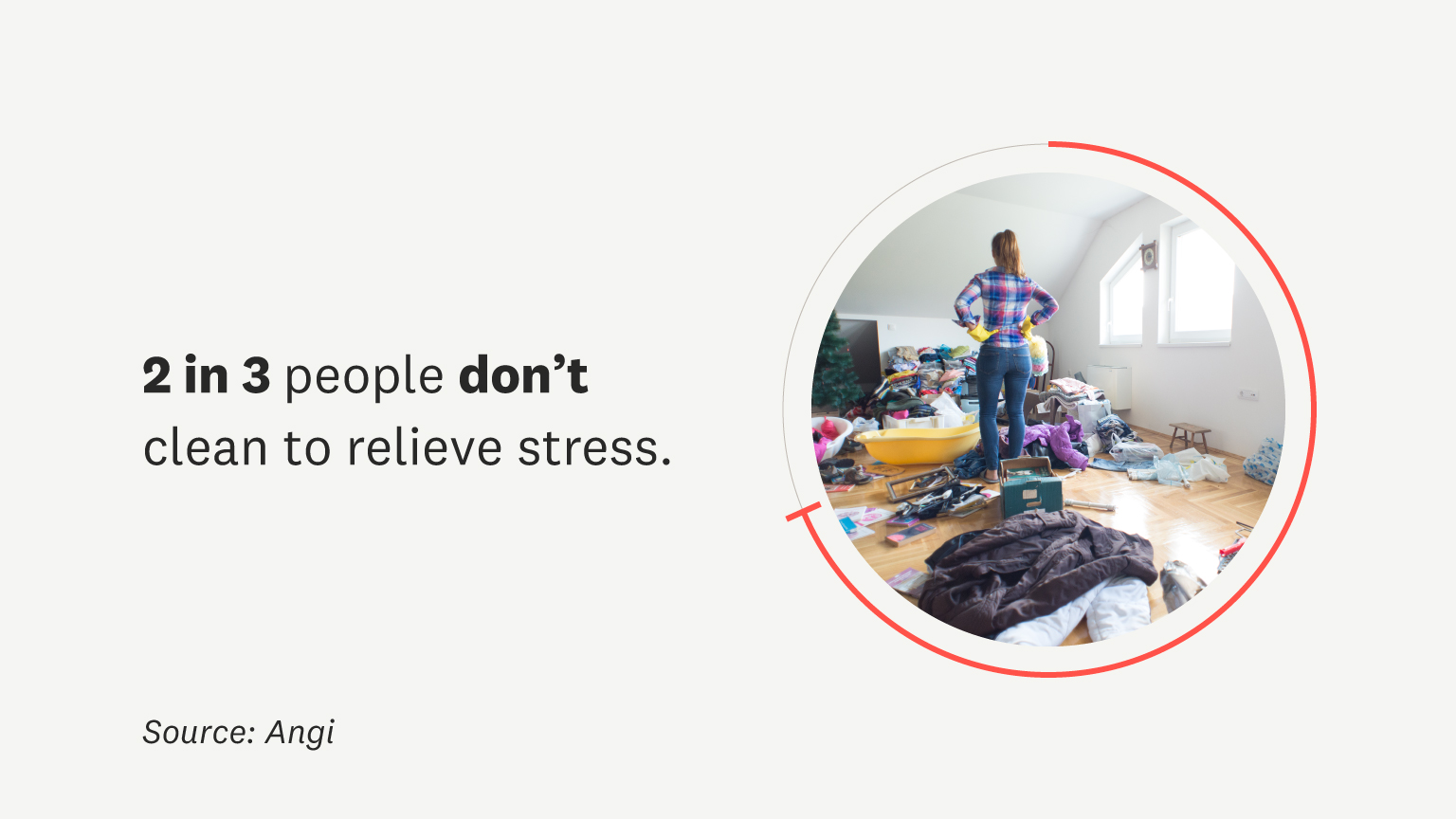
This is surprising given the benefits of stress cleaning. According to an article for the HuffPost, psychologists explain that cleaning feels good because it provides a sense of control over your environment. Repetitive tasks, like sweeping or washing dishes, self-soothe and clear the mind. Plus, there’s a feeling of accomplishment once it’s done.
Yet if there are so many advantages of stress cleaning, why do over two-thirds of people report that they don’t do it?
While people might enjoy some of the calming side effects when they clean, it seems most don’t wipe, dust, or scrub away their stress. When it comes to stress relief, people may be more likely to turn to other coping methods, such as exercising, yoga, or meditation.
That said, most Americans might be missing out on the mindful benefits of cleaning.
Despite the majority of people rejecting cleaning as a stress reliever, nearly three in five reported that a messy home stresses them out.
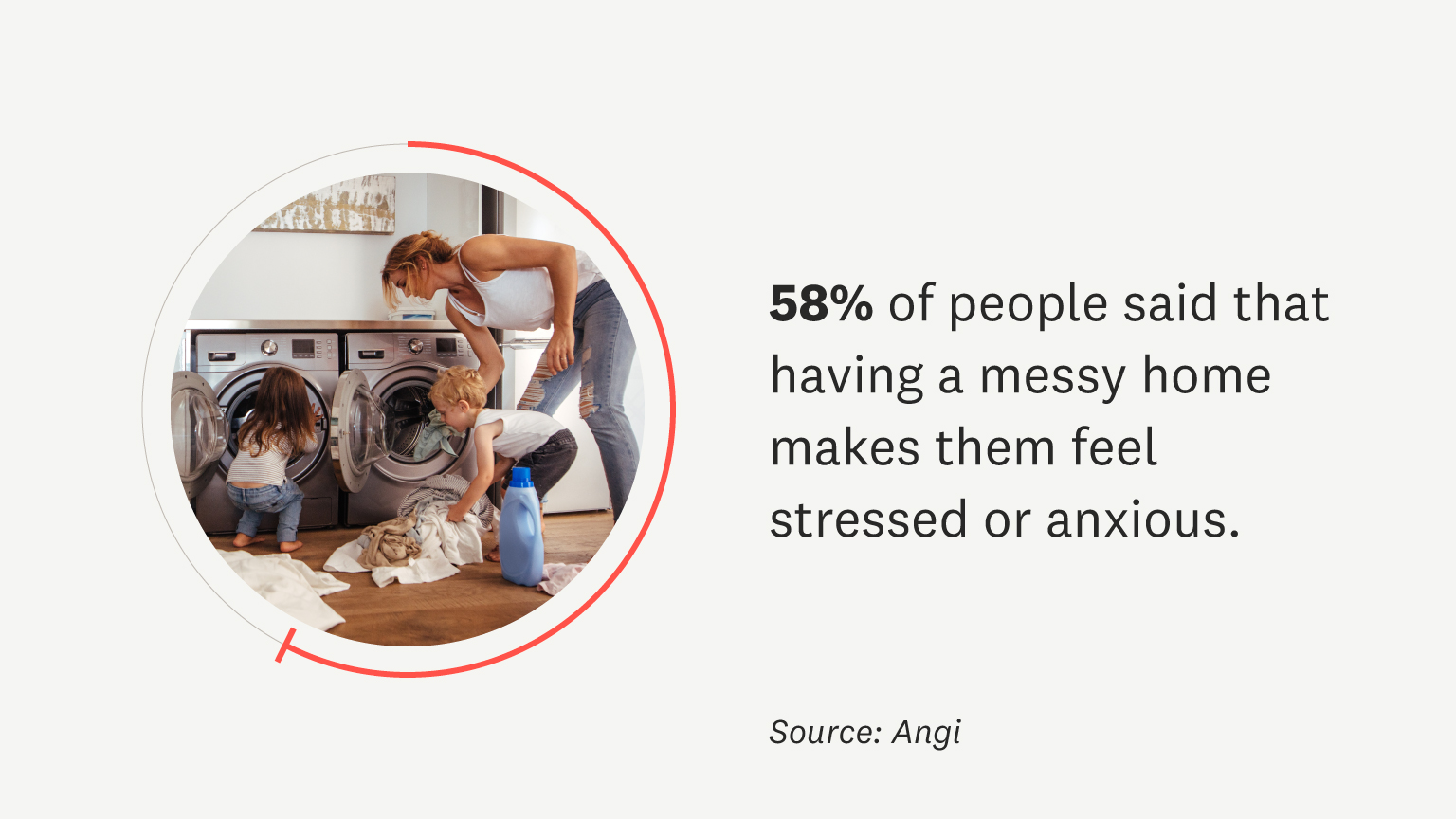
Perhaps most people prefer to get cleaning done as fast as possible to avoid that build-up of mess, without taking the time to enjoy the act of cleaning itself.
Of those who said a messy home stresses them out, most were women (59%). Men aren’t quite as worried about untidiness, with 40% of “yes” respondents being male.

So, messes in the house are stressing people out. The most anxiety-inducing mess of all? Clutter.
Twenty-eight percent of people identified clutter as the mess that makes them most stressed or anxious. Clutter is often cited as a stress-inducer, since an untidy accumulation of stuff can overwhelm your space.
Clutter can increase irritability, add tension, and affect the ability to focus. A study in the Personality and Social Psychology Bulletin found that women who described their homes as cluttered had higher levels of the stress hormone cortisol. Women who described their homes as tidy and restorative were less stressed.
Marie Kondo’s popular KonMari Method of tidying has shown us how valuable it can be to declutter. If you’re part of the 28% who finds clutter the most stressful mess in your home, it might be time to ditch unnecessary belongings and restore order to your space.
Other stressful messes that respondents identified were a sink full of dishes (22%), a messy kitchen (18%), and a dirty bathroom (16%).
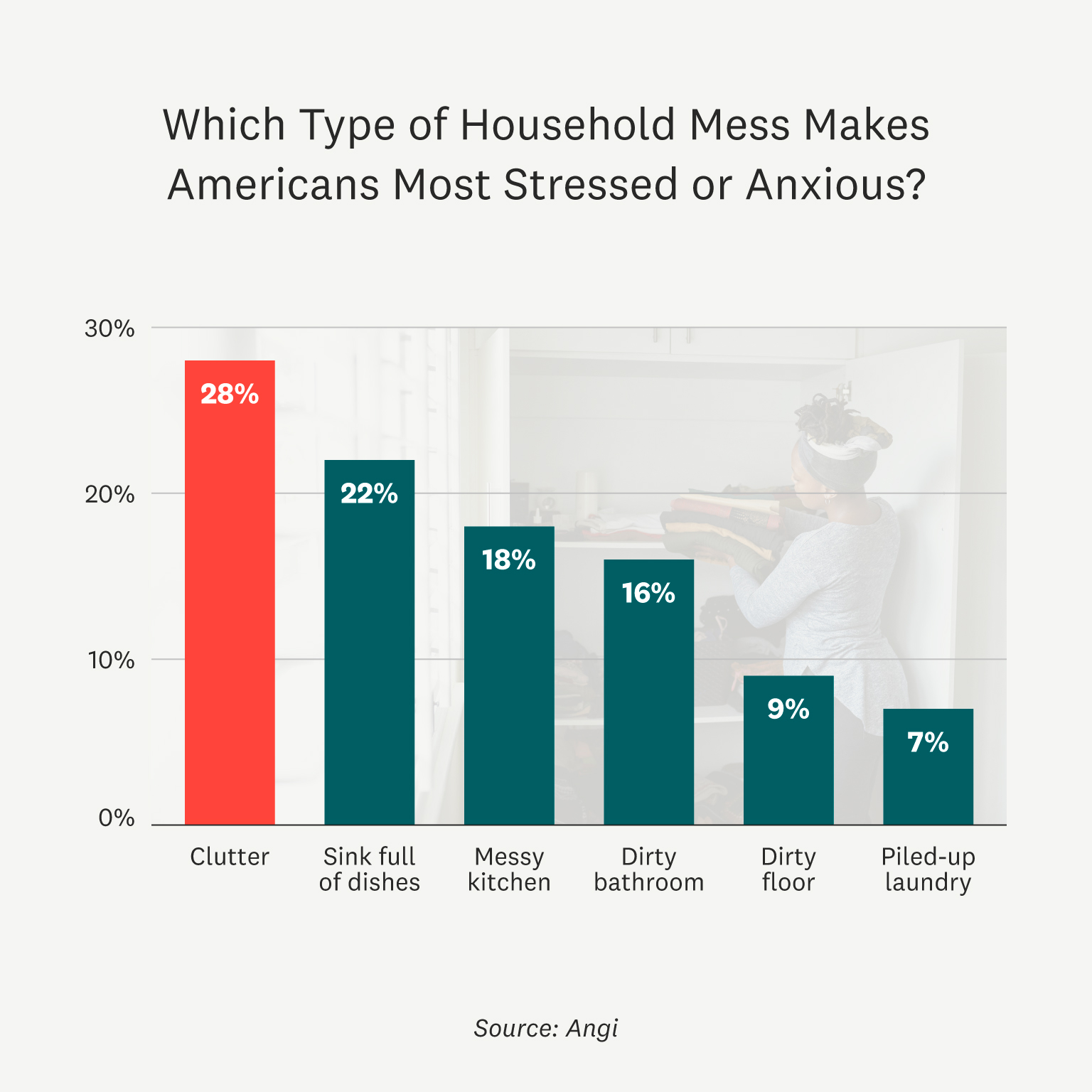
Men and women tended to mostly agree on the most stressful household messes. However, interestingly, a sink of dishes stressed out more men (58%) than women (42%). For men, clutter only barely beats out a sink of full dishes for the most stressful chore.
With disarray weighing on your shoulders, cleaning can feel like an irritating obligation to keep messes at bay. When asked to identify the chore they find the most annoying to do, 26% of people chose cleaning the bathroom.
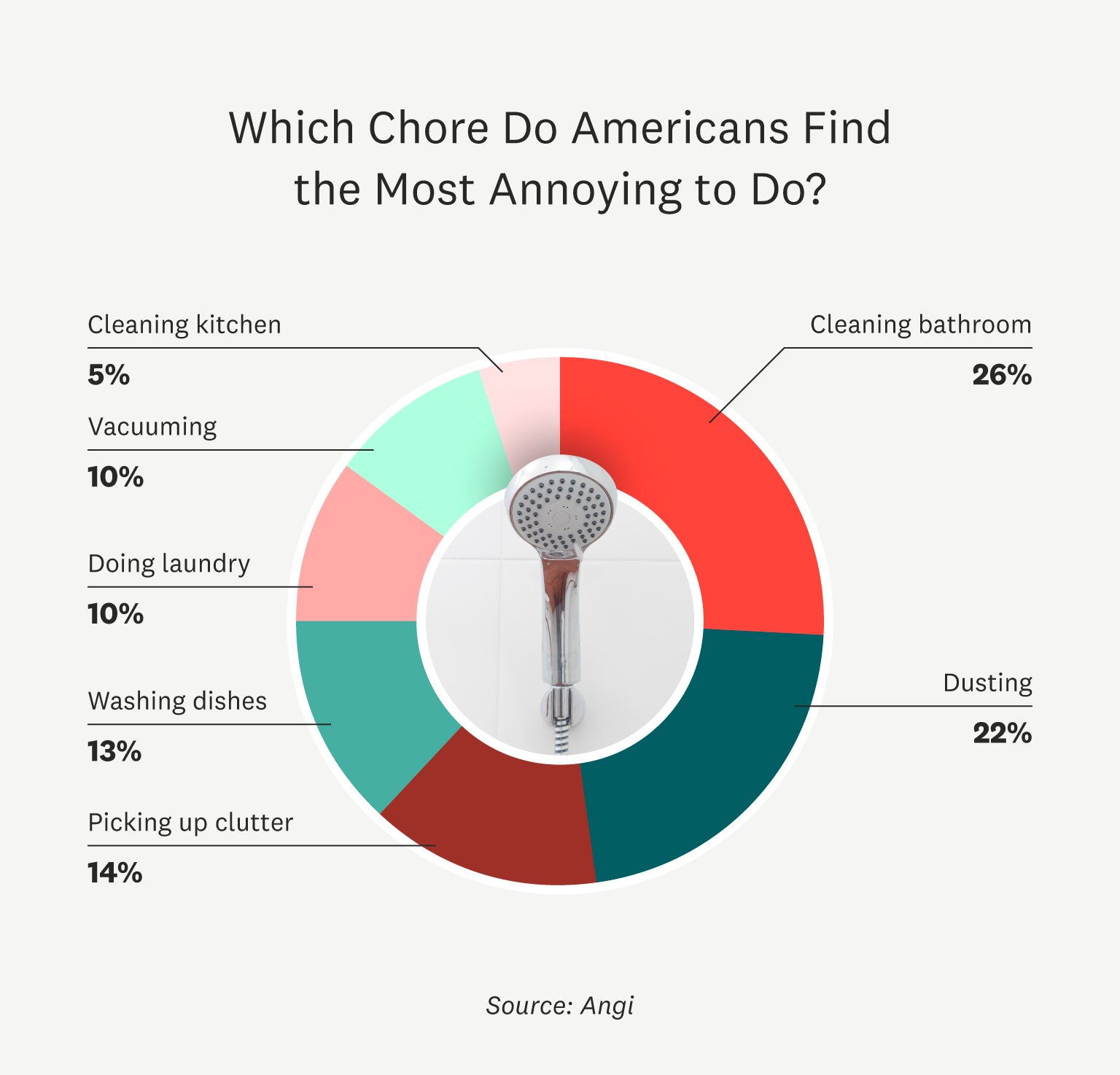
It’s unsurprising that most people find scrubbing the toilet less than desirable. However, dusting was also a high contender, with 22% rating it as the most annoying chore. It can certainly be irksome to reach each corner of every shelf and cabinet to wipe away accumulating dust.
It’s possible that stressful clutter and annoying chores like scrubbing the toilet and dusting the shelves are holding people back from enjoying cleaning.
Cleaning the kitchen sat at the very bottom of the list, with only 6% rating it as the most annoying chore. It seems most people don’t mind wiping the countertops and cleaning out the fridge.
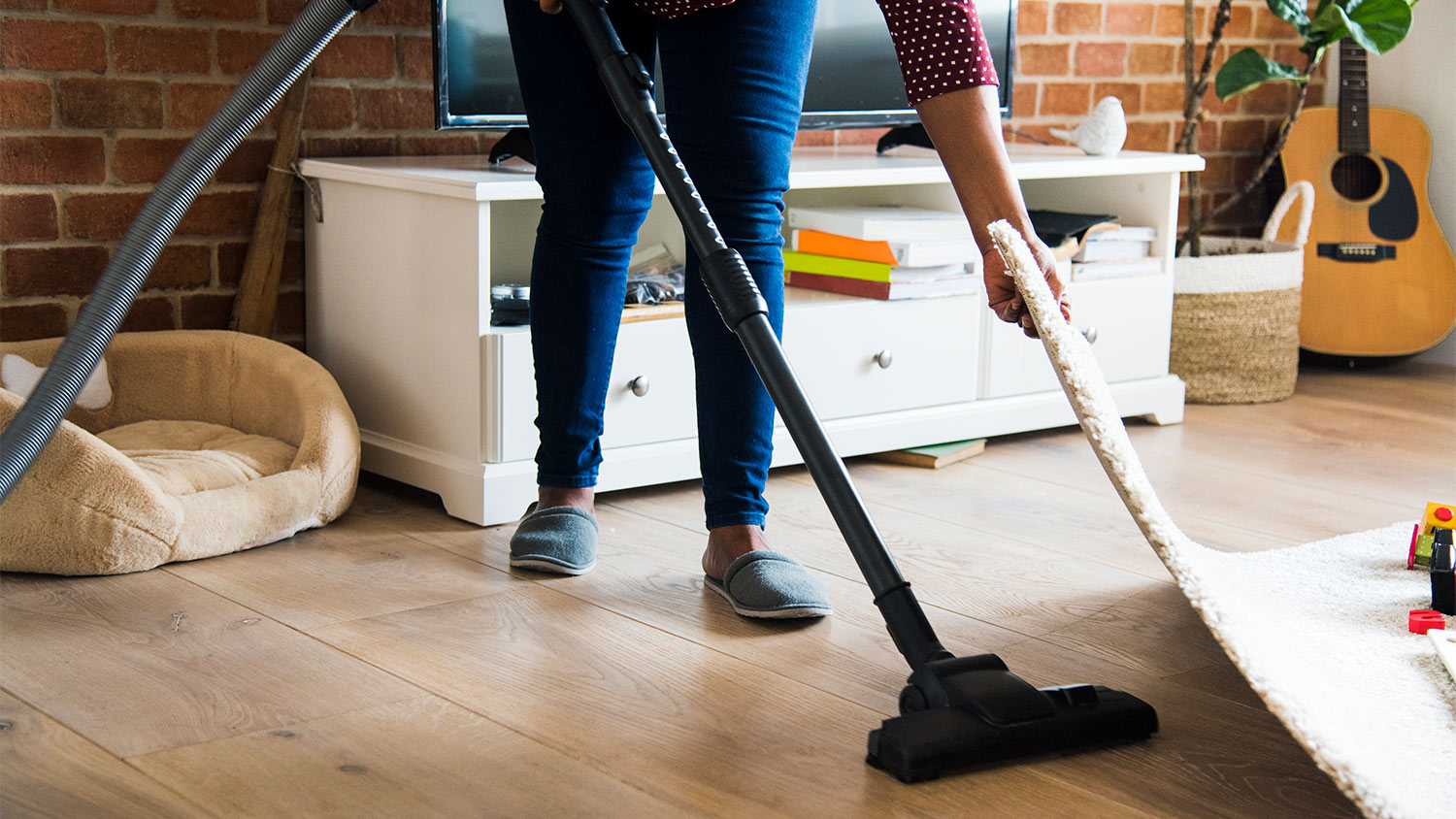
When it comes to mess and chores, it sounds like stress all around. However, there are many ways to make cleaning more enjoyable.
You can enlist the help of a professional cleaning company to take much of the scrubbing and vacuuming off your plate. You can also work with a professional home organizing company to turn seemingly unmanageable clutter into a highly organized system. Both can give you relief from untidy stuff taking over your living space.
You can also break up a large task into manageable chunks with a house cleaning checklist.
You can even turn cleaning into a mindfulness activity. One study published in the Mindfulness journal found that, when people washing dishes focused on the task at hand by thinking about the smell of the soap and the temperature of the water, the activity actually increased positive feelings and decreased nervousness.
To help you reap all the stress cleaning benefits, we’ve compiled some tips for more mindful cleaning in the infographic below. Hopefully, these strategies will make cleaning the bathroom a tad less annoying.

This study was conducted for Angi using Google Surveys. The sample consisted of no less than 1,500 completed responses per question. Post-stratification weighting has been applied to ensure an accurate and reliable representation of the total population. Responses were collected in August 2021.
From average costs to expert advice, get all the answers you need to get your job done.

Garage clean-out costs vary considerably depending on the garage size, the waste type and amount, and how much work you do yourself.

Discover how much move-out cleaning costs based on your home size, condition, the amount of belongings, and the services included.
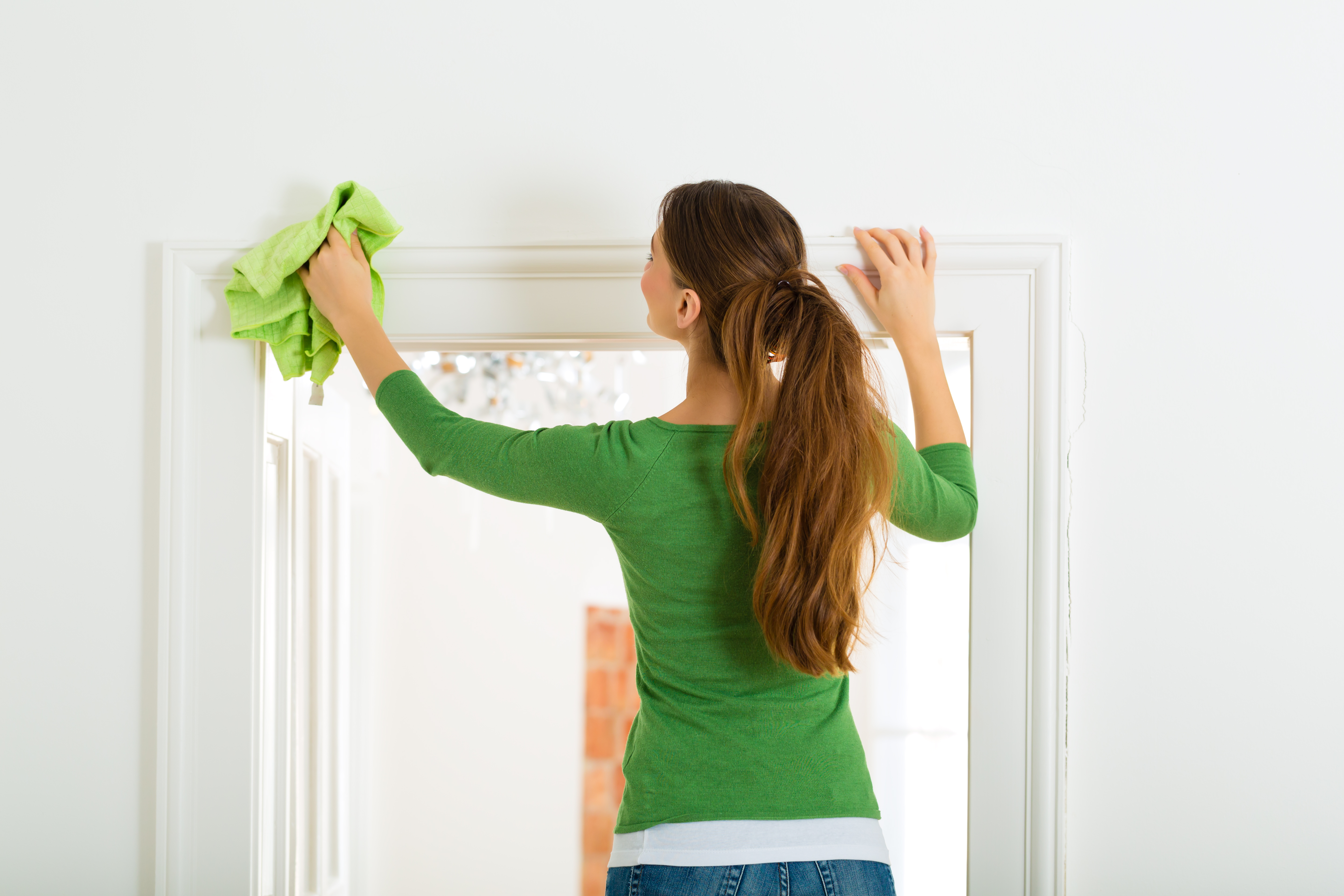
Curious how much it costs to hire a housekeeper? Discover 2025 prices, key cost factors, and tips to save on professional housekeeping for your home.

A dirty house can increase your stress levels. This guide explains who to hire to deep clean your house and why hiring someone makes sense.

Steam cleaning can be an effective way to disinfect your home. We explain what steam cleaning is, what you can steam clean in your home, and when to avoid it.

Construction can leave your home a mess. Use our post-construction cleaning checklist so you can enjoy your updated home free of dust and debris.